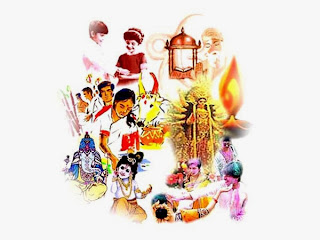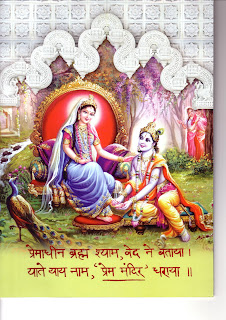Not All religions are the same
One goal we often hear voiced by the Hindu community in America is to preserve the authenticity of the teachings of Hinduism and pass that heritage on to future generations. There is a statement many of us make which undermines these efforts. We often say, "All religions are the same." Why do we say it? Sometimes we don't want to offend anyone. This is a safe, politically correct, fallback position. Sometimes, not knowing the intricacies of Hinduism, we fail to recognize its uniqueness and greatness. If Hinduism were the same as all other religions, then why would we care if our children convert to other religions? Why would we organize conferences to preserve our essential teachings and develop better ways of teaching them to our kids? If Hinduism were the same as all other religions, then why would I, who was not raised Hindu, have chosen Hinduism over other religions?
It is true that there cannot be two Gods. There cannot be a separate Hindu God, a separate Christian God, a separate Muslim God, a separate Jewish God, etc. Our Vedas state, "Ekamevadvitiyam brahm nehananasti kinchan," "God is one and absolute. There can be no other." So whoever is worshiping God, anywhere in this universe, is worshiping the same God. And all theistic religions agree on certain general characteristics of God. God is perfection, absolute divinity, omnipresent, all-knowing, all powerful, blissful, etc. This is the extent of the description available in other religions, but not in Hinduism. The Sanskrit scriptures of Hinduism reveal the knowledge of God on a much deeper level. This is both what makes Hinduism great and also what makes it more challenging to comprehend.
Some Hindus complain that it is so easy for the members of other religions to summarize the teachings of their religion. It is easy to summarize general and superficial knowledge. But the depth, scope and detail of Hinduism require more skill and training to understand, distill and communicate to others.Clearly it is important to have a qualified teacher. Anyone can teach finger-painting, but it takes someone with a PhD to teach nuclear physics. Hinduism must be learned from someone with not only theoretical understanding, but with practical experience of God.
The word God is a general term. It is vague and non-specific, like the word fruit. Fruit is abstract, because fruit does not exist as such. Bananas exist; apples exist; mangoes exist. If I ask you to describe what fruit looks like, you cannot, because fruit is a general term. You could only describe the appearance of a mango or an apple--a specific fruit. Similarly, the description of God in other religions is non-specific and general. What does God look like? You cannot tell me, because God is just an abstract term. However, in Hinduism we have the specific description of God's form and personal names. He is Krishna, He is Ram, He is Vishnu, He is Siva, She is Durga, etc. We know what He looks like, and we know what His Divine personality is like.
Supreme God has uncountable Divine powers. When most of them are dormant or inactive, then God is formless and is referred to by the term Brahman. When more of His powers are active, God has form, and is referred to by the term Paramatma. This is almighty God, Whose three main forms are Vishnu, Shiv and Durga. Krishna says in the Gita, "Ye yatha mam prapadyante tanstathaiva bhajamyaham." In other words, "I come to you in whatever form you worship Me." Hinduism not only incorporates the concepts of God of other religions but also reconciles the apparent differences in the various descriptions, all the while providing an unmatched depth and elegance in the description of God.
Hinduism is also unique in saying that God can be experienced, and, in fact, that is the ultimate goal of a soul. This was one of the most compelling factors for me in my decision to adopt Hinduism. Not only does Hinduism answer all of my intellectual questions, but it clearly states that you can meet God in person. Now who wouldn't want to do that? However, if you don't have the full description of God, then how will you find Him? It would be like someone coming from India and landing at JFK in New York and asking the people he sees, "Have you seen my friend? Where is my friend? I want to meet him." They would ask, "What does your friend look like? Do you have a picture of him? What is his name? Where does he live?" The man answers that he only knows that his friend moved to America 20 years ago, but he does not remember what he looks like, nor does he have a picture of him. People will think him insane because he may search all over America for his whole life and never have any chance of finding his friend. Similarly, without a proper description of God, how could we hope to find Him? Hinduism provides such a detailed description of God, which is like providing the photograph and the address of the man's friend. Now all the man has to do is follow the path to reach his friend. This path, known as the path of God realization, is also described in Hinduism.
There are many more such points which illustrate the greatness of Hinduism. So remember, although there are similarities between Hinduism and the other religions of the world, and as Hindus we respect all religions, nonetheless, there are features of Hinduism which are not found in other religions and which make Hinduism great.
BY - Swami Nikhilanand, a disciple of Jagadguru Shree Kripaluji Maharaj, adopted Hinduism as a young man, and received the order of sannyas in the raganuga tradition of Vrindaban, India.
It is true that there cannot be two Gods. There cannot be a separate Hindu God, a separate Christian God, a separate Muslim God, a separate Jewish God, etc. Our Vedas state, "Ekamevadvitiyam brahm nehananasti kinchan," "God is one and absolute. There can be no other." So whoever is worshiping God, anywhere in this universe, is worshiping the same God. And all theistic religions agree on certain general characteristics of God. God is perfection, absolute divinity, omnipresent, all-knowing, all powerful, blissful, etc. This is the extent of the description available in other religions, but not in Hinduism. The Sanskrit scriptures of Hinduism reveal the knowledge of God on a much deeper level. This is both what makes Hinduism great and also what makes it more challenging to comprehend.
Some Hindus complain that it is so easy for the members of other religions to summarize the teachings of their religion. It is easy to summarize general and superficial knowledge. But the depth, scope and detail of Hinduism require more skill and training to understand, distill and communicate to others.Clearly it is important to have a qualified teacher. Anyone can teach finger-painting, but it takes someone with a PhD to teach nuclear physics. Hinduism must be learned from someone with not only theoretical understanding, but with practical experience of God.
The word God is a general term. It is vague and non-specific, like the word fruit. Fruit is abstract, because fruit does not exist as such. Bananas exist; apples exist; mangoes exist. If I ask you to describe what fruit looks like, you cannot, because fruit is a general term. You could only describe the appearance of a mango or an apple--a specific fruit. Similarly, the description of God in other religions is non-specific and general. What does God look like? You cannot tell me, because God is just an abstract term. However, in Hinduism we have the specific description of God's form and personal names. He is Krishna, He is Ram, He is Vishnu, He is Siva, She is Durga, etc. We know what He looks like, and we know what His Divine personality is like.
Supreme God has uncountable Divine powers. When most of them are dormant or inactive, then God is formless and is referred to by the term Brahman. When more of His powers are active, God has form, and is referred to by the term Paramatma. This is almighty God, Whose three main forms are Vishnu, Shiv and Durga. Krishna says in the Gita, "Ye yatha mam prapadyante tanstathaiva bhajamyaham." In other words, "I come to you in whatever form you worship Me." Hinduism not only incorporates the concepts of God of other religions but also reconciles the apparent differences in the various descriptions, all the while providing an unmatched depth and elegance in the description of God.
Hinduism is also unique in saying that God can be experienced, and, in fact, that is the ultimate goal of a soul. This was one of the most compelling factors for me in my decision to adopt Hinduism. Not only does Hinduism answer all of my intellectual questions, but it clearly states that you can meet God in person. Now who wouldn't want to do that? However, if you don't have the full description of God, then how will you find Him? It would be like someone coming from India and landing at JFK in New York and asking the people he sees, "Have you seen my friend? Where is my friend? I want to meet him." They would ask, "What does your friend look like? Do you have a picture of him? What is his name? Where does he live?" The man answers that he only knows that his friend moved to America 20 years ago, but he does not remember what he looks like, nor does he have a picture of him. People will think him insane because he may search all over America for his whole life and never have any chance of finding his friend. Similarly, without a proper description of God, how could we hope to find Him? Hinduism provides such a detailed description of God, which is like providing the photograph and the address of the man's friend. Now all the man has to do is follow the path to reach his friend. This path, known as the path of God realization, is also described in Hinduism.
There are many more such points which illustrate the greatness of Hinduism. So remember, although there are similarities between Hinduism and the other religions of the world, and as Hindus we respect all religions, nonetheless, there are features of Hinduism which are not found in other religions and which make Hinduism great.
BY - Swami Nikhilanand, a disciple of Jagadguru Shree Kripaluji Maharaj, adopted Hinduism as a young man, and received the order of sannyas in the raganuga tradition of Vrindaban, India.



Comments
Post a Comment